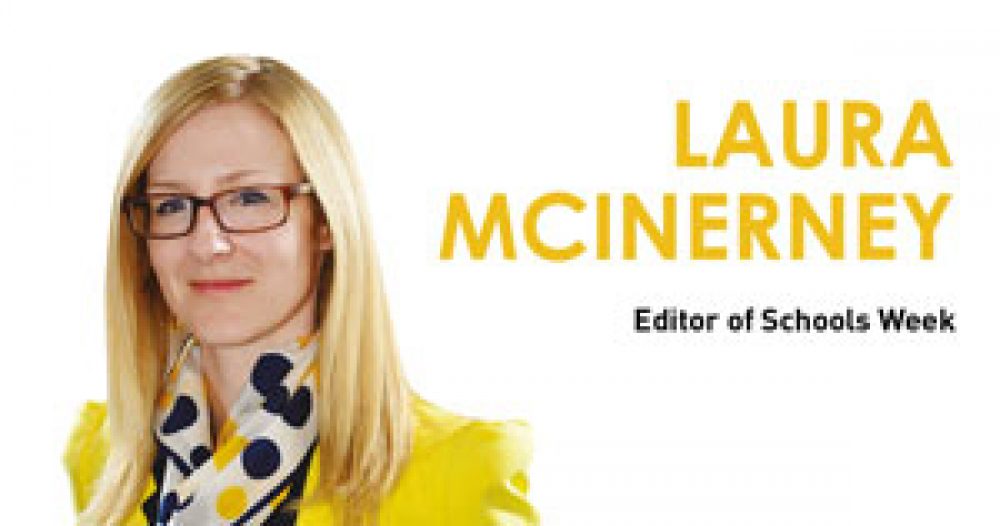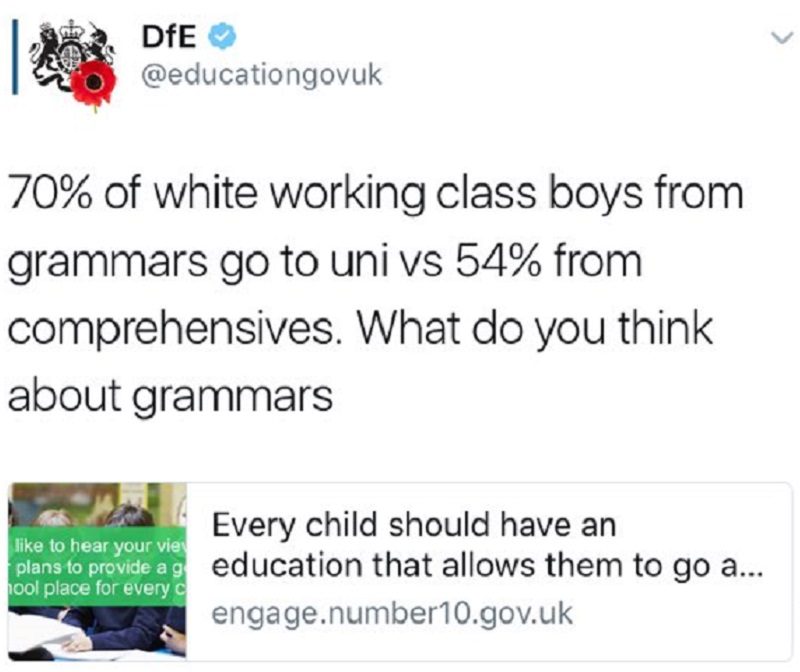Official statistics show there are more than 14 million parents with dependent children in the UK. About 12 million of those have school-aged children.
If you were a politician, and your main aim was to get votes, aiming to impress the 12 million parents, as opposed to half a million teachers, is more likely to bag you a win.
Also, if you’re canvassing for opinion, that pool of 12 million gives you much more scope for finding out what you want to hear.
The half a million teachers have a vested interest in keeping their jobs easier. They don’t want to do a bad job; but no sensible person wants to make their job harder. Also, teachers are reasonably well informed about their job. If you want to get a simple policy validated, then asking teachers is not your best bet.
Instead, you ask people who are rushed and time-poor.
All of which explains why No 10 is focusing its efforts on canvassing parents over grammar schools.
As our front cover story reveals, a campaign has been created to find parents and push them to answer a few questions about selective schools. The webpages on which they do this provide information that gives the government’s reasons for introducing the policies, without a nod towards the stacks of evidence against it.
The generous explanation of why No 10 wants more parents to fill in the consultation is that parents matter. Their taxes pay for schools. Their children spend hours in them each day. What parents want is important, and they have every right to give their views.
The cynical explanation is that No 10 knows that parents are often poorly informed about schools policy, too tired and busy to find out more, and if dangled a shiny prospect are unlikely to say they are against the idea, especially if no one tells them that the shiny prospect has serious downsides.
We know “parent demand” can be whipped up easily because we saw it during the early days of free schools
We know “parent demand” can be whipped up easily because we saw it during the early days of free schools. Prospective founders had to show that parents wanted the school to open, leading to turf wars in which parents were offered all kinds in return for signatures.
What we also know is that parents didn’t necessarily vote with their feet. Which is how we’ve ended up with a third of free schools more than 20 per cent empty, even after several years (that’s according to the National Audit Office).
Many have also felt stung by the school that eventually opened. I’ve lost count of the people who have told me it didn’t live up to expectation.
As I used to say to free school advocates – including those now influencing government – if you asked parents if they wanted a new Lamborghini, free, outside their house tomorrow, I reckon 100 per cent would say yes. Does that mean we should give every parent a Lamborghini? No. Not unless we want to bankrupt the country for no good reason.
Parents should have a say. But we must be aware that preference does not equate to sensible policy. And we must be even more wary when the government is leading those preferences by putting out misinformation.
Although the Department for Education deleted their tweets about grammar schools (below), which the statistics authority labelled as “disappointing” and “not a fair representation”, they remained online for several hours. That misinformation is out there.
The department’s website is also constantly pumping out other messages that seem equally misleading. For example it tweeted, “selective schools are almost 50 per cent more popular than non-selective schools” – which is based on a fairly spurious comparison of the way parents fill out admissions forms sent to local authorities.
[Given that parents who get their child into a grammar school usually have only once choice available one in the area, whereas parents using local schools may choose between several outstanding schools, what this really represents is that parents in selective areas actually have less choice, but I digress…]
As this paper went to print, it was unsurprising to hear that “post-truth” has been designated as word of the year by the Oxford English Dictionary.
It has been a year of being told that “experts” are not to be trusted. That “the public” is “taking back control”. In the case of schools, that means the opinion of the 12 million are, likely, going to outweigh the voices of the half million – however badly informed or misled the former, however wise the latter.
And it will be hard for anyone to stand up against it. Saying the half a million are better informed will be painted as arrogance. Saying the 12 million are being manipulated will be painted as condescension.
If there is a hope, it’s that the new parent-led campaign group, Parents and Teachers for Excellence, are focused on knowledge as a central plank of education. Let us hope they commit to spreading accurate knowledge among their grassroots and refuse to perpetuate such unfair and “disappointing” representations.









Politicians have always misled the electorate and been economical with the truth. But it’s now done with a cynical disregard for facts. The media is usually compliant (Schools Week is an honourable exception) in churning whatever stuff is spewed out by the DfE.
We are not just in a post-truth era but entering the age of the sycophant where those willing to publicly support the DfE line and trash those who don’t will be praised and rewarded. Those who oppose are crudely labelled as ‘Marxists’, ‘enemies of promise’ and the ‘Blob’. The term ‘evidence-based’ has taken on a new meaning: evidence is whatever supports politicians’ prejudices. Anything that doesn’t is dismissed – after all, the UK has had enough of experts, apparently.
You say “If there is a hope, it’s that the new parent-led campaign group, Parents and Teachers for Excellence, are focused on knowledge as a central plank of education…..and refuse to perpetuate such unfair and “disappointing” representations.”
Are you being sincere in this statement?
Have you seen their list of supporters listed here http://www.parentsandteachers.org.uk/supporters
The group is stuffed with Free School Leaders and the founder is Rachel De Souza.
I would not call this a “parent-led” campaign. Even the name of the organisation “Parents and Teachers for Excellence” seems designed to mislead. I am sure Nick Gibb will be celebrating the “accuracy” of this “parent-led” impartial group in all his forthcoming zany edicts on how to teach proper-like.
I’m afraid we’re rather in the hand of existing Heads here. They need to be much more pro-active in following the excellent example of the Surrey Heads. Why are they not all writing to their parents setting out the powerful case against a return to secondary moderns?
The short survey is a sham. It makes it too easy to submit multiple, fictitious responses. I managed to answer the questionnaire in the names of Ebenezer Scrooge and Jacob Marley. http://www.localschoolsnetwork.org.uk/2016/11/dfe-short-survey-on-grammar-schools-accepts-response-from-scrooge